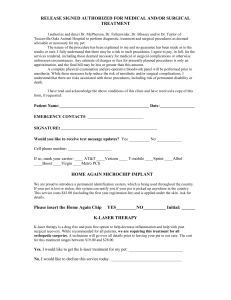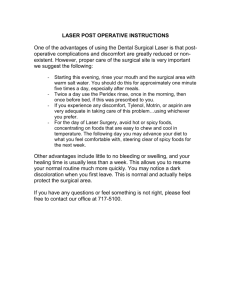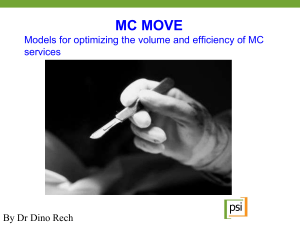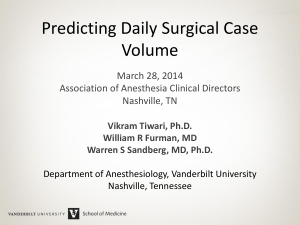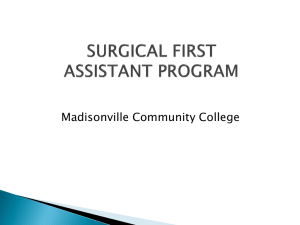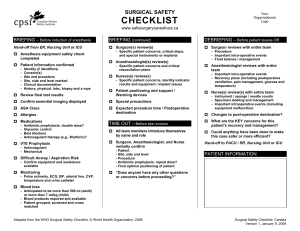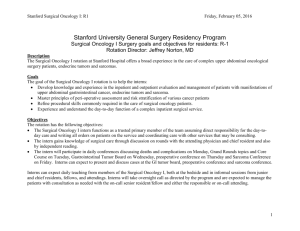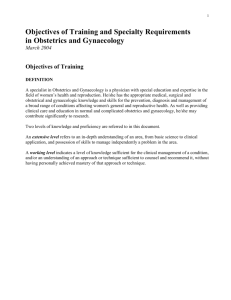General Surgery
advertisement
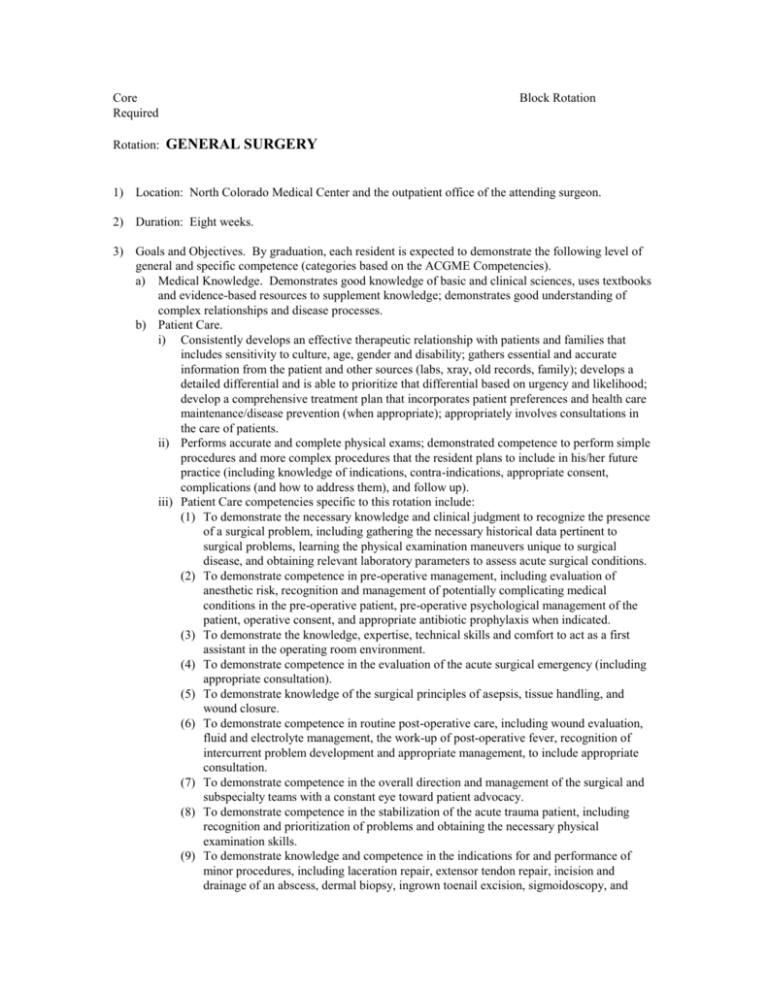
Core Required Rotation: Block Rotation GENERAL SURGERY 1) Location: North Colorado Medical Center and the outpatient office of the attending surgeon. 2) Duration: Eight weeks. 3) Goals and Objectives. By graduation, each resident is expected to demonstrate the following level of general and specific competence (categories based on the ACGME Competencies). a) Medical Knowledge. Demonstrates good knowledge of basic and clinical sciences, uses textbooks and evidence-based resources to supplement knowledge; demonstrates good understanding of complex relationships and disease processes. b) Patient Care. i) Consistently develops an effective therapeutic relationship with patients and families that includes sensitivity to culture, age, gender and disability; gathers essential and accurate information from the patient and other sources (labs, xray, old records, family); develops a detailed differential and is able to prioritize that differential based on urgency and likelihood; develop a comprehensive treatment plan that incorporates patient preferences and health care maintenance/disease prevention (when appropriate); appropriately involves consultations in the care of patients. ii) Performs accurate and complete physical exams; demonstrated competence to perform simple procedures and more complex procedures that the resident plans to include in his/her future practice (including knowledge of indications, contra-indications, appropriate consent, complications (and how to address them), and follow up). iii) Patient Care competencies specific to this rotation include: (1) To demonstrate the necessary knowledge and clinical judgment to recognize the presence of a surgical problem, including gathering the necessary historical data pertinent to surgical problems, learning the physical examination maneuvers unique to surgical disease, and obtaining relevant laboratory parameters to assess acute surgical conditions. (2) To demonstrate competence in pre-operative management, including evaluation of anesthetic risk, recognition and management of potentially complicating medical conditions in the pre-operative patient, pre-operative psychological management of the patient, operative consent, and appropriate antibiotic prophylaxis when indicated. (3) To demonstrate the knowledge, expertise, technical skills and comfort to act as a first assistant in the operating room environment. (4) To demonstrate competence in the evaluation of the acute surgical emergency (including appropriate consultation). (5) To demonstrate knowledge of the surgical principles of asepsis, tissue handling, and wound closure. (6) To demonstrate competence in routine post-operative care, including wound evaluation, fluid and electrolyte management, the work-up of post-operative fever, recognition of intercurrent problem development and appropriate management, to include appropriate consultation. (7) To demonstrate competence in the overall direction and management of the surgical and subspecialty teams with a constant eye toward patient advocacy. (8) To demonstrate competence in the stabilization of the acute trauma patient, including recognition and prioritization of problems and obtaining the necessary physical examination skills. (9) To demonstrate knowledge and competence in the indications for and performance of minor procedures, including laceration repair, extensor tendon repair, incision and drainage of an abscess, dermal biopsy, ingrown toenail excision, sigmoidoscopy, and vasectomy. In addition, the resident is expected to gain knowledge and surgical expertise with surgical problems common to family practice, including appendicitis, cholelithiasis and breast disease. iv) Practice-Based Learning and Improvement. Investigates and evaluates his/her own patient care, appraises and assimilates scientific evidence, and uses this information to work toward improvements in patient care. d) Interpersonal and Communication Skills. Written documentation/communication is legible, timed and dated, complete (but with appropriate conciseness), accurate and using appropriate language and abbreviations. Verbal communication with patients, families, and members of the healthcare team are respectful and effective (including effective presentation skills). Keeps supervising physicians up to date on patients. e) Professionalism. Consistently on-time, works hard, able to identify required tasks and complete them in a timely and efficient manner; team-oriented and willing to assist with work load as needed to optimize team function; able to identify need for help and request it; demonstrates a positive attitude and interactions with team members; adheres to ethical principles in the course of his/her practice; identifies and progresses toward personal educational goals; is receptive to, seeks, and incorporates feedback. f) Systems-Based Practice. Demonstrates an awareness of the larger healthcare system, assists patients in dealing with system complexities through the effective use of hospital and community resources; participates in some system improvement through identification of errors and system problems and initial discussion of potential system improvements; acts as an effective teacher of junior residents and other members of the healthcare team. c) 4) Methods: a) Two 4-week blocks of general surgical training are required during the R2 year. b) Residents on the surgery rotation are responsible for the admission history and physical, admission assessment, pre-operative orders, and daily progress notes. c) In the operating room, all surgical procedures are supervised by the attending of record as the primary operator. As the resident’s skills develop, minor procedures are performed with the resident as primary operator and the attending surgeon as assistant. At no time does the resident serve as primary operator for major surgical procedures, and no surgical procedures are performed without supervision. d) The resident is supervised by the surgical attending, and care is given in consultation with that attending. e) To gain further knowledge in pre-operative assessment and indications for procedures, to gain further skill in outpatient procedures, and to gain experience in post-hospital follow-up, the resident is encouraged to spend time with the attending surgeon in his/her outpatient practice. f) Other surgery experience includes: i) Additional experience in the principles of asepsis, tissue handling and wound closure are gained on the gynecology, obstetrics, and orthopedics rotations. ii) Stabilization and management of acute trauma is emphasized on the emergency room rotation, and when taking call with the attending surgeon. In addition, every resident is required to complete an Advanced Trauma Life Support (ATLS) course early in the R2 year. iii) Outpatient surgical procedures, pre-operative evaluation, and post-operative follow-up are also covered in the Procedures rotation and through experience at the FMC. iv) Surgery topics (including urgent and emergent topics) are part of the core didactic curriculum. 5) Evaluation: This curricular area is evaluated as outlined in the policy “Evaluation of Residents”. SG Reviewed and Approved: H. Daniel Fahrenholtz, MD, MBA, Program Director
